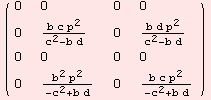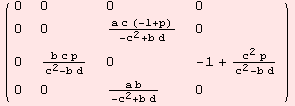![ShowAd[ad = Table2ad[bas = {e_1, u_1, u_2, u_3, u_4}, ( {{0, u_3, 0, -u_1, 0}, {-u_3, 0, 0, 0, u_1}, {0, 0, 0, 0, p u_2}, {u_1, 0, 0, 0, u_3}, {0, -u_1, -p u_2, -u_3, 0}} )], 4]](../HTMLFiles/index_1.gif)
1.1(2).2
In [Ko01] p.46, the homogeneous pair (g,h) with index 1.1(2).2 is defined as
![ShowAd[ad = Table2ad[bas = {e_1, u_1, u_2, u_3, u_4}, ( {{0, u_3, 0, -u_1, 0}, {-u_3, 0, 0, 0, u_1}, {0, 0, 0, 0, p u_2}, {u_1, 0, 0, 0, u_3}, {0, -u_1, -p u_2, -u_3, 0}} )], 4]](../HTMLFiles/index_1.gif)
| 0 | 0 | 0 | |||
| 0 | 0 | 0 | |||
| 0 | 0 | 0 | 0 | ||
| 0 | 0 | 0 | |||
| 0 | 0 |
for p∈R. Any ρ-invariant scalarproduct B is of the form
![]()
![]()
![]()

The tensor ν:g×g→m is determined by
![]()
| 0 | 0 | 0 | |||
| 0 | 0 | ||||
| 0 | 0 | 0 | |||
| 0 | 0 | ||||
| 0 |
The Levi-Civita connection Λ:g→gl(m) is determined by
![]()
 |
|
 |
|
 |
|
 |
|
 |
The non-zero evaluations of the Riemannian-curvature tensor R:m×m→gl(m) are determined by
![]()
 |
|
 |
|
 |
|
 |
|
 |
|
 |
The Ricci-curvature Ric:m×m→R is determined by
![]()

We demand Ric=0. Thus, b=0 and p=1.
![]()
![]()
![]()
But then, the Riemannian curvature tensor vanishes also.
![]()
![]()
Note, this result is independent of the signature of B.
| Created by Mathematica (August 15, 2006) |